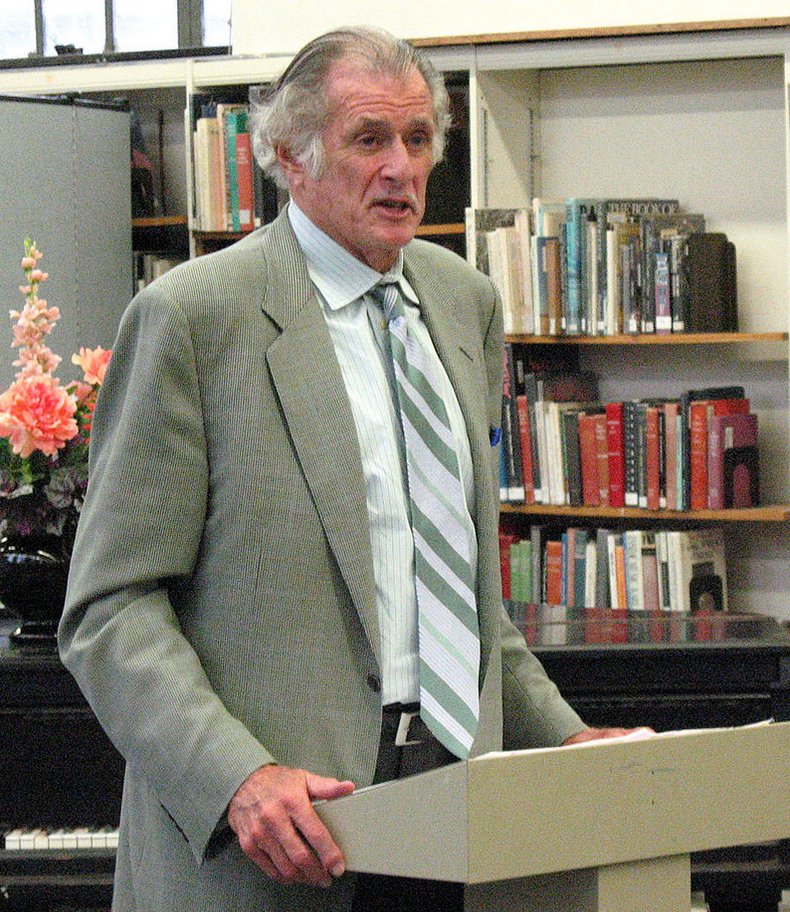The world lost a great sportswriter yesterday: R.I.P. Frank Deford
I’m biased; I’ll admit it. I firmly believe that sportswriters produce some of the best writing—journalism, I mean—you’ll ever find. I’ve sung the praises of Roger Angell often. He’ll be 97 before the end of the current baseball season, and I dread the day I’ll open up the digital newspaper and find his obit. But we lost another great one this weekend—a man as elegant as his prose, Frank Deford.

Frank Deford — Photo by Bridgeport Public Library from Bridgeport, Connecticut – Flickr, CC BY 2.0
The headline on his obit in The Washington Post says he “wrote about sports with panache and insight.” Panache. Not a lot of writers these days can lay claim to that adjective.
I can’t remember exactly when Frank Deford hit my radar, but I do remember eagerly hitting up the newsstand the day his ill-fated all-sports newspaper, The National, finally launched. He wrote about sports, yes, but he found the story behind the box score. He found the details that made the picture sharp as HDTV, decades before high def existed. One picture worth 1,000 words? I’d put Deford’s words up against that cliché any day of the week.
Sorry, that happens to me sometimes. When I read someone whose voice is so distinctive, it tinges my own. And Deford—oh yeah, distinctive. You bet.
Here’s the a bit from the opening of his Sports Illustrated piece “The Boxer and the Blonde.” The Washington Post highlighted in in Deford’s obit, calling it not just a story about an iconic 1941 prize fight, but
“…a love story, as the title suggests, set in the flickering twilight glow of prewar America.”
Vintage Frank Deford: “The Boxer and the Blonde”
The boxer and the blonde are together, downstairs in the club cellar. At some point, club cellars went out, and they became family rooms instead. This is, however, very definitely a club cellar. Why, the grandchildren of the boxer and the blonde could sleep soundly upstairs, clear through the big Christmas party they gave, when everybody came and stayed late and loud down here. The boxer and the blonde are sitting next to each other, laughing about the old times, about when they fell hopelessly in love almost half a century ago in New Jersey, at the beach. Down the Jersey shore is the way everyone in Pennsylvania says it. This club cellar is in Pittsburgh.
The boxer is going on 67, except in The Ring record book, where he is going on 68. But he has all his marbles; and he has his looks (except for the fighter’s mashed nose); and he has the blonde; and they have the same house, the one with the club cellar, that they bought in the summer of 1941. A great deal of this is about that bright ripe summer, the last one before the forlorn simplicity of a Depression was buried in the thick-braided rubble of blood and Spam. What a fight the boxer had that June! It might have been the best in the history of the ring. Certainly, it was the most dramatic, alltime, any way you look at it. The boxer lost, though. Probably he would have won, except for the blonde—whom he loved so much, and wanted so much to make proud of him. And later, it was the blonde’s old man, the boxer’s father-in-law (if you can believe this), who cost him a rematch for the heavyweight championship of the world. Those were some kind of times.
The boxer and the blonde laugh again, together, remembering how they fell in love. “Actually, you sort of forced me into it,” she says.
“I did you a favor,” he snaps back, smirking at his comeback. After a couple of belts, he has been known to confess that although he fought 21 times against world champions, he has never yet won a decision over the blonde—never yet, as they say in boxing, outpointed her. But you can sure see why he keeps on trying….
Notice how he slips that pivotal fight into the middle of the second paragraph? He’ll get to it in more detail—it’s a long article—but for right now, it’s just atmospherics, background, as he gives us space to get to know the protagonists. That’s great storytelling. That’s a writer who’s confident in his abilities. He doesn’t need to rush us to the highlights; he knows we’re hanging on every word.
Calling his own game
They say Babe Ruth “called” his home run in the 1932 World Series—signaled that he would hit it out of the park. And then he did.
Well for the last 37 years, Frank Deford has been broadcasting about sports on National Public Radio. On May 7th—just three weeks before he died—he delivered his final column. He led with the closing of a venerable institution:
…I was so upset to learn that the grandest big top ever — Ringling Brothers, Barnum and Bailey — was going out of business later this month. The Greatest Show on Earth — and it probably was exactly that once upon a time.
Well, by coincidence, this particular tiny show on earth that consists entirely of me talking about sports on NPR is also folding its tent flaps this May of 2017. Yes, this is my swansong, my farewell, my last hurrah. Adieu, adios, arrivederci, auf wiedersehen.